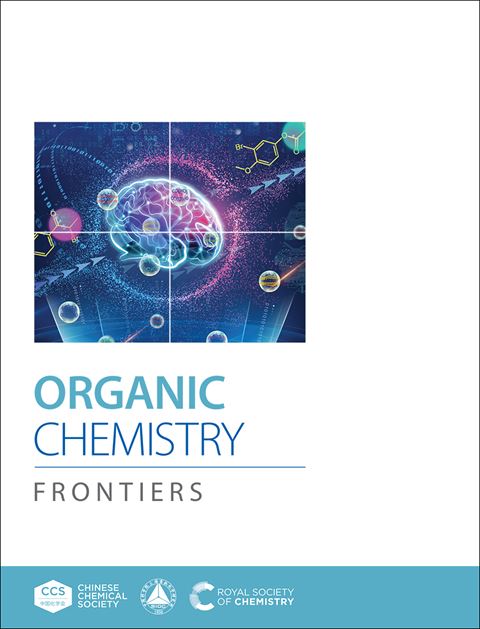2-Pyridone-Enabled Manganese-Catalyzed ortho-Selective Deuteration of Aromatic Amides with D₂O
IF 4.6
1区 化学
Q1 CHEMISTRY, ORGANIC
引用次数: 0
Abstract
We present a highly efficient and regioselective methodology for the synthesis of ortho-deuterated aromatic amides, utilizing Mn(CO)₅Br as the catalyst, 2-pyridone as the CMD base, and D₂O as the deuterium source. This approach exhibits a broad substrate scope and exceptional functional group tolerance, enabling the late-stage deuteration of complex molecules with high yields and substantial deuterium incorporation. Mechanistic investigations suggest that 2-pyridone plays a critical role in the success of the reaction, acting as an endogenous base that facilitates reversible C−H activation and subsequent hydrogen-deuterium exchange. Deuterium-labeled compounds have become indispensable tools in a wide array of scientific domains[1], including mechanistic investigations of organic reactions[2], the development of deuterated drugs[3], and quantitative mass spectrometry analyses[4]. Consequently, the synthesis of deuterium-labeled organic compounds has attracted significant research attention. Aromatic carboxylic acids and their derivatives, as fundamental structural units, play a pivotal role in drug development and are commonly incorporated into the molecular frameworks of a wide variety of pharmacologically active compounds[5], such as Procainamide[6], Amisulpride[7], and Nemonapride[8]. Among these, benzamide derivatives have garnered substantial interest due to their broad spectrum of biological and pharmacological activities. Therefore, the design and development of selective synthetic methodologies for site-specific deuterated amide compounds is of considerable academic importance and holds significant potential for both theoretical advancements and practical applications in pharmaceutical chemistry. The direct hydrogen-deuterium (H/D) exchange of amide compounds is typically facilitated under catalytic conditions that involve acids, bases, or transition metals (such as Pd, Pt, Ru, Rh, and Ir)[9]. The use of directing groups to promote these exchanges has been extensively studied. For example, Yu et al. demonstrated efficient ortho-deuteration of aromatic amides using a palladium catalyst and 8-aminoquinoline as a directing group (Scheme 1a)[10]. More recently, our group developed an alternative methodology utilizing Ni(OTf)2 or CuO as catalysts to achieve efficient ortho-deuteration of benzamide derivatives[11]. However, these approaches often rely on costly deuterium sources and HFIP as the solvent, which reduces the theoretical deuterium incorporation and limits their broader applicability, as well as their potential for further functionalization.2-吡啶酮使锰催化芳香酰胺与d2o的正选择性氘化反应
我们提出了一种高效和区域选择性的方法来合成邻氘化芳香酰胺,利用Mn(CO)₅Br作为催化剂,2-吡啶酮作为CMD碱,D₂O作为氘源。这种方法具有广泛的底物范围和特殊的官能团耐受性,使复杂分子的后期氘化具有高产量和大量氘掺入。机理研究表明,2-吡啶酮作为内源性碱促进可逆的C−H活化和随后的氢-氘交换,在反应的成功中起着关键作用。氘标记化合物已成为广泛科学领域不可或缺的工具,包括有机反应的机理研究,氘化药物的开发,以及定量质谱分析。因此,氘标记有机化合物的合成引起了广泛的研究关注。芳香羧酸及其衍生物作为基本结构单元,在药物开发中起着关键作用,通常被纳入各种药理活性化合物[5]的分子框架中,如Procainamide[6]、Amisulpride[7]和Nemonapride[8]。其中,苯甲酰胺衍生物由于其广泛的生物学和药理学活性而获得了大量的兴趣。因此,设计和开发特定位点氘化酰胺化合物的选择性合成方法具有重要的学术意义,并且在药物化学的理论进步和实际应用方面具有重要的潜力。在酸、碱或过渡金属(如Pd、Pt、Ru、Rh和Ir)[9]的催化条件下,酰胺化合物的直接氢-氘(H/D)交换通常是容易的。利用指导小组促进这些交流已经得到了广泛的研究。例如,Yu等人使用钯催化剂和8-氨基喹啉作为导向基团(方案1a)证明了芳香酰胺的高效邻位氘化(Scheme 1a)。最近,我们的团队开发了一种替代方法,利用Ni(OTf)2或CuO作为催化剂来实现苯酰胺衍生物[11]的高效邻氘化。然而,这些方法通常依赖于昂贵的氘源和HFIP作为溶剂,这减少了理论上的氘掺入,限制了它们更广泛的适用性,以及它们进一步功能化的潜力。
本文章由计算机程序翻译,如有差异,请以英文原文为准。
求助全文
约1分钟内获得全文
求助全文
来源期刊

Organic Chemistry Frontiers
CHEMISTRY, ORGANIC-
CiteScore
7.90
自引率
11.10%
发文量
686
审稿时长
1 months
期刊介绍:
Organic Chemistry Frontiers is an esteemed journal that publishes high-quality research across the field of organic chemistry. It places a significant emphasis on studies that contribute substantially to the field by introducing new or significantly improved protocols and methodologies. The journal covers a wide array of topics which include, but are not limited to, organic synthesis, the development of synthetic methodologies, catalysis, natural products, functional organic materials, supramolecular and macromolecular chemistry, as well as physical and computational organic chemistry.
 求助内容:
求助内容: 应助结果提醒方式:
应助结果提醒方式:


